The key to a tasty brew is getting that kombucha ratio just right! You’ll find many different kombucha ratios on the internet, but how do you know which one is best?
My recipe has been perfected over many years of brewing with careful attention to all of the factors involved.
Am I just lucky? Nope! My recipe has been duplicated in many, many households with great success. I’m confident that my secret to the BEST kombucha ratio will work for you, too!
Let’s get to it!
*Disclosure: This post may contain affiliate links to products (including Amazon). I’ll earn a small commission if you make a purchase through my link, at no additional cost to you! Regardless, I only link to products that I personally use on our homestead or believe in.
What is Kombucha?
Kombucha is a fizzy, sweet yet tangy, fermented tea beverage that has been consumed by humans for centuries and it’s certainly not going out of style. It is filled with gut-healthy probiotics, plus all of the health benefits that are traditionally obtained from brewed tea.
This tasty beverage is created by the action of a Symbiotic Culture of Bacteria and Yeast (SCOBY). The SCOBY is a gelatinous, mat-like film that sits on top of your brew and makes the magic happen. I know it looks a little weird, but it’s essential for a good brew!
What does the SCOBY do?
- The yeast present in the SCOBY is in charge of converting the fermentable sugars into ethanol (AKA alcohol) and carbon dioxide (hello fizz!)
- Then, the bacteria present in the SCOBY then takes over by converting the ethanol into organic acids. These beneficial bacteria also inhibit the growth of any pathogenic bacteria (AKA the “bad bugs”)
- In the end, you have a low-sugar, low-alcohol tasty beverage that is good and good for you! Yum!
The BEST Kombucha Ratio
Vessel Size | Tea + Water | Sugar | Diluting Water | Starter Liquid |
1 Gallon | 3 Tbsp Tea (9 tea bags) 4 Cups Water | 1 Cup | 7 Cups | 1 Cup |
2 Gallons | 6 Tbsp Tea (18 tea bags) 4 Cups Water | 2 Cups | 14 Cups | 2 Cups |
1 Cup | 1/2 tsp Tea (1/2 tea bag) 5 oz Water | 1 Tbsp | 9 oz | 1 Tbsp |
The Tea Ratio
This is where it all starts! You can’t have kombucha without tea, and you definitely need to have a balanced amount to produce a smooth brew. Let’s chat about the right amount based on your container size.
How much tea should I use?
- 1 Gallon container (most common): Make a strong tea using a mixture of 3 Tbsp of loose-leaf tea (or 9 tea bags) in 4 cups of boiling water. Steep for 6 minutes, then discard the tea leaves.
- 2 Gallon container: Use 6 Tbsp of loose-leaf tea (or 18 tea bags) in 8 cups of boiling water. Steep for 6 minutes, then discard the tea leaves.
- 1 Cup container: Use 1/2 tsp of loose-leaf tea (or ½ a tea bag) in 5 oz of boiling water. Steep for 6 minutes, then discard the tea leaves.
What kind of tea should I use?
This is where you can really start to customize your brew to develop a flavor that you love! It’s important to choose organic tea leaves so that you can limit contaminants or chemicals.
Both loose-leaf tea and pre-packaged tea bags are acceptable, however, I prefer loose-leaf tea. It’s often cheaper this way, plus I like that it’s a more sustainable option (no packaging!).
You can make kombucha from the following types of teas:
- Black Tea – bold and fruity (don’t use Earl Grey or any others with flavoring/oils)
- Oolong Tea – sweet, fruity, and smooth; Oolong is my personal favorite!
- Green Tea – light and soft
- White Tea – flowery and delicate (not recommended for beginning batches and will need mixing with black tea)
- Rooibos Tea – flowery and delicate (not recommended for beginning batches and will need mixing with black tea)
- Yerba Mate – fruity and smooth (not recommended for beginning batches and will need mixing with black tea)
Buying the right tea will really make or break your brew! I experimented with several different brands of oolong tea and was disappointed until I found the tea below. It’s a complete game-changer! I’ve had many people tell me they don’t like kombucha, but when they try my brew using this tea, they are SOLD!
The Homesteading RD's Product Picks | |
This is THE best tea out there! Besides the intoxicating smooth and sweet flavor, Tie Guan Yin is also popular because of its numerous healing properties. When you combine a great tasting tea classic, pleasant fragrance and the health benefits, you can see why this tea is so sought after! | |
The Sugar Ratio
Yes, sugar! You absolutely cannot skip this part. Your SCOBY needs sugar, otherwise, it will starve.
Don’t worry, though! Nearly all of this sugar will get converted into organic acids by the end of the fermentation period. The longer you let it go, the less sugar there will be.
- Prefer a tart brew with less sugar? Let it ferment for 2- 3 weeks
- Prefer a sweet treat? Let it ferment for 1-2 weeks
*However, this time period is heavily dependent on your brewing environment, room temperature, and how active your SCOBY is, so always do a taste test before bottling.
How much sugar should I add to my kombucha?
- 1 Gallon container (most common): Add 1 cup of sugar to your 4 cups of freshly brewed tea.
- 2 Gallon container: Add 2 cups of sugar to your 8 cups of freshly brewed tea.
- 1 Cup container: Add 1 Tbsp of sugar to your 5 oz of freshly brewed tea.
What kind of sugar should I use?
Just like with the other ingredients we have discussed, you want as clean of a product as possible. You technically can use basic white sugar, but I recommend organic cane juice crystals. Azure Standard has some great bulk options as well!
The Homesteading RDs's Product Picks | |
USDA Certified Organic Cane Sugar This Organic Cane Sugar is made by squeezing and evaporating the juice from freshly harvested organic sugar canes. This results in a golden sweet crystal that is as sweet as... well, sugar. | |
Avoid using the following:
- Brown sugar, raw sugar, or whole cane sugar
- Honey, agave, maple syrup, coconut sugar, palm or syrups
- Stevia, xylitol, artificial sweeteners
The Water Ratio
Once you’ve made the tea and dissolved the sugar into it, it’s time to dilute it down further. If don’t do this, then your kombucha will be much too strong. Don’t add the starter tea and SCOBY just yet!
How much water should I add?
- 1 Gallon container (most common): Add 7 cups of cold water to your sugar tea mixture.
- 2 Gallons container: Add 14 cups of cold water to your sugar-tea mixture.
- 1 Cup container: Add 9 oz of cold water to your sugar-tea mixture.
What kind of water should I add?
- Well-water: You can use water straight from the tap.
- City water: You’ll want to use filtered water to avoid contaminants, chlorine and fluoride. If you don’t have access to filtered water, let your water sit out for 24 hours to allow the fluoride to evaporate.
The Starter Tea Ratio
The addition of starter tea (which is a fancy word for just plain kombucha) to each brew is essential to reduce the pH a bit and give it a head start on fermentation. Without it, you risk your brew fermenting too slowly and developing the growth of pathogenic bacteria.
How much starter tea should I add to my kombucha?
- 1 Gallon container (most common): Add 1 cup of starter tea to your dilusugar tea-tea mixture.
- 2 Gallon container: Add 2 cups of starter tea to your diluted sugar-tea mixture.
- 1 Cup container: Add 1 Tbsp of starter tea to your diluted sugar-tea mixture.
Where can I find starter tea?
- If you buy a kombucha starter kit (that’s the same one I bought years ago!), then it will arrive with a package of starter tea for you!
- Find a friend who is brewing kombucha and see if they’ll give you a cup.
- Buy a bottle of PLAIN kombucha at the store
The Homesteading RD's Product Picks | |
This is the same kit that I started with and it has everything you need to get started except for the bottles. The cultures are grown in their Madison, WI brewery using triple filtered water, high-quality sugar and loose leaf tea. They guarantee your first batch to ferment or they'll send you a free replacement. What a deal! | |
Kombucha Add-Ins Ratio
Once your kombucha has finished brewing, it’s time to bottle it and add some fun flavorings! It’s important to only add these flavor add-ins at bottling time (not during your first fermentation in the large container) so that your SCOBY remains pure and unadulterated.
You can do the same flavor for all of your bottles, or try a different flavor for each one. This is where it gets super fun!
How much should I add?
- Fruit juice: ¼ cup per 16 oz bottle
- Fruit: chopped and filled to ¼-½” of the bottom of the bottle
- Ginger: chopped into matchsticks to ⅛”-¼” of the bottom of the bottle
- Herbs: 2-3 tsp, to taste
What kind of flavoring add-ins are best?
The options here are limitless! However, these are my favorite combinations:
- Strawberries + Basil
- Mango Juice
- Ginger
- Strawberries + Lemon (think strawberry lemonade!)
- Mint + Lime
- Pomegranate Juice
Let’s Put My BEST Kombucha Ratio Into Practice!
*The instructions below are for a 1-gallon container, please adjust the ratio if you are using a different size.
Step 1: Make the tea
Start by heating 4 cups of water in a pot, then turn off the heat once the water starts to boil. Then, add 3 Tbsp of loose-leaf tea (or 9 tea bags) and let the tea steep for 6 minutes. If you’re using loose-leaf tea and you don’t have a reusable fabric tea bag, just add the tea leaves directly and strain them out afterward.
After 6 minutes, remove the tea bag (or strain out the loose tea leaves) and stir in 1 cup of organic cane juice crystals. Set the sugar-tea mixture aside to cool.
Step 2: Fill the bottles
With clean hands, remove the SCOBY from the brewing jar and place it on a clean plate. Pour out 1 cup of kombucha and set it aside. Bring out 5-6 clean bottles and begin filling with your flavoring add-ins (see above for ideas!).
Then, place a funnel on the bottles and fill the rest of the way up with finished kombucha from your large container. I’ve found 2″ of headspace to be perfect. Finally, close the swing-top lid and set the filled bottles aside.
Step 3: Prepare the next brew of kombucha
Now that the brewing container is empty, clean it with diluted white vinegar. Don’t use soap or any residues may negatively impact fermentation. Next, add the sugar-tea mixture that we made earlier on the stove.
Lastly, add 7 cups of ice water to dilute the sugar-tea mixture. Ice water is necessary if the sugar-tea mixture is still hot (above 88 degrees). You don’t want to fry your active cultures! Add the reserved 1 cup of kombucha, place the SCOBY on top, and cover with a cotton fabric cloth secured with a rubber band.
Step 4: Let the kombucha ferment
Place the newly filled kombucha fermenting container and bottles on a shelf (dark, warm place) to rest undisturbed. After 2-3 days, move your bottles to the fridge and now you can drink them! Keep the fermenting container on the shelf.
After 1-3 weeks, your kombucha brew will be ready to start the process all over again! Give it a taste to determine when you want to stop the brewing process and start bottling. The longer it sits, the tarter it will be with a lower sugar content. I’ve found the 2 weeks is perfect for my taste preferences and fermentation environment.
What Supplies Do I Need to Brew Kombucha?
I’m glad you asked! Thankfully, you don’t need much to start brewing kombucha and I highly recommend getting an all-in-one kit to keep it easy.
The Homesteading RD's Product Picks | |
This is the same kit that I started with and it has everything you need to get started except for the bottles. The cultures are grown in their Madison, WI brewery using triple filtered water, high-quality sugar and loose leaf tea. They guarantee your first batch to ferment or they'll send you a free replacement. What a deal! | |
Perfect for kombucha, beer, kiefer, soda, or any other homebrew! Includes collapsible silicone funnel and replacement high-pressure gaskets. The glass is rated for 58 psi (twice as much as required by heavily carbonated beer.) These bottles are specifically made for carbonated drinks. | |
This is THE best tea out there! Besides the intoxicating smooth and sweet flavor, Tie Guan Yin is also popular because of its numerous healing properties. When you combine a great tasting tea classic, pleasant fragrance and the health benefits, you can see why this tea is so sought after! | |
This USDA Certified Organic Cane Sugar is made by squeezing and evaporating the juice from freshly harvested organic sugar canes. This results in a golden sweet crystal that is as sweet as... well, sugar. | |
Other Articles You’ll Love:
- Fermented Honey Garlic (Plus, Tips to Avoid Botulism!)
- Fire Cider Recipe
- Fermented Eggs Recipe (EASY!)
- Fermented Turnips Recipe
Conclusion
Kombucha is a tasty beverage that is not only healthy for you, but it is fun and super easy to make! Why shell out $5 per bottle at the store, when you can make your own for a fraction of the cost? Plus, the sustainability of being able to reuse your own bottles is an added bonus.
Now that you know my secret to the BEST kombucha ratio for a tasty brew, what are you waiting for?! If you have any favorite flavor combinations, please share them below!
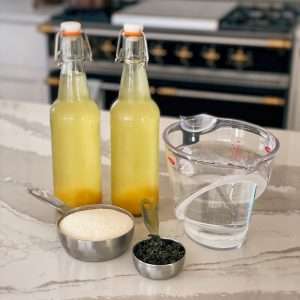
The BEST Kombucha Ratio for a Tasty Brew
Equipment
- 1 Gallon Kombucha Jar see kombucha kit suggestion below
- 5 16 oz Swing Top Bottles see bottle suggestion below
- 1 Funnel
- 1 12"x12" tightly woven cloth for covering the kombucha jar
Ingredients
- 3 Tbsp Oolong Tea (or 9 tea bags); See tea suggestion below
- 1 Cup Organic Cane Juice Crystals See sugar suggestion below
- 1 Cup Kombucha Starter Tea See kombucha kit suggestion below
- 1 SCOBY See kombucha kit suggestion below
- 1 ¼ Cup Fruit juice or chopped fruit See recipe ideas in article above
Instructions
- Boil 4 cups of water
- Add 3 Tbsp of loose leaf tea to a reusable tea bag (or use 9 tea bags).
- Once boiling, turn off the heat and add the tea bag(s). Let steep for 6 minutes.
- After 6 minutes, remove the tea bag(s) and stir in 1 cup of cane juice crystals. Set aside to cool.
- Next, fill your clean, empty 1 gallon brewing jar with the sugar-tea mixture
- Then, add 7 cups of ice water to dilute the sugar-tea mixture (ice water is necessary if the sugar-tea mixture is still hot. You don’t want to fry the active cultures that we're adding next!)
- Once the ice has melted and the solution is no longer hot, add 1 cup of kombucha starter tea and gently place the SCOBY on top (it's ok if it floats, sinks or flops sideways! Just let it do its thing).
- Cover kombucha jar with a piece of tightly woven cloth and secure with a rubber band
- Place your 1 gallon jar of kombucha in a dark, warm location where it will be undisturbed.
- At 1 week, do a taste test and see what you think. Still too sweet? Let it go for another week and test again. Most people brew in the timeframe of 1-3 weeks. It all depends on how active your SCOBY is, environmental factors and your taste preferences. The thicker your SCOBY becomes, the more active it will be. I've found that a thickness of about 1" is perfect for my brew, so I pull off extra layers when it gets too thick.
- Once you're satisfied with the taste of your kombucha brew, bring it back to the kitchen and complete steps 1-4 again to make the sugar-tea mixture.
- Now that you have a full gallon jar of finished kombucha, there are a few more steps to add on!
- With clean hands, remove SCOBY from the brewing jar and place on a clean plate
- Reserve 1 cup of kombucha. Set aside. Set out clean bottles to begin filling.
- Fill clean bottles with add-ins of your choice (see above for ideas!)
- Fill bottles with finished kombucha using a funnel and close the swing-top lid. Set bottles aside.
- Pick back up with steps 5-9 to make the next batch of new kombucha.
- Now, place the bottles of finished kombucha and the 1 gallon jar of new kombucha back to the warm, dark location where it will not be disturbed.
- After 2-3 days, move the bottles of finished kombucha to the fridge and now you can drink them!
- After 1-3 weeks, your 1 gallon of kombucha brew will be ready to start the process all over again!
Notes
The Homesteading RD's Product Picks | |
This is the same kit that I started with and it has everything you need to get started except for the bottles. The cultures are grown in their Madison, WI brewery using triple filtered water, high-quality sugar and loose leaf tea. They guarantee your first batch to ferment or they'll send you a free replacement. What a deal! | |
Perfect for kombucha, beer, kiefer, soda, or any other homebrew! Includes collapsible silicone funnel and replacement high-pressure gaskets. The glass is rated for 58 psi (twice as much as required by heavily carbonated beer.) These bottles are specifically made for carbonated drinks. | |
This is THE best tea out there! Besides the intoxicating smooth and sweet flavor, Tie Guan Yin is also popular because of its numerous healing properties. When you combine a great tasting tea classic, pleasant fragrance and the health benefits, you can see why this tea is so sought after! | |
This USDA Certified Organic Cane Sugar is made by squeezing and evaporating the juice from freshly harvested organic sugar canes. This results in a golden sweet crystal that is as sweet as... well, sugar. | |

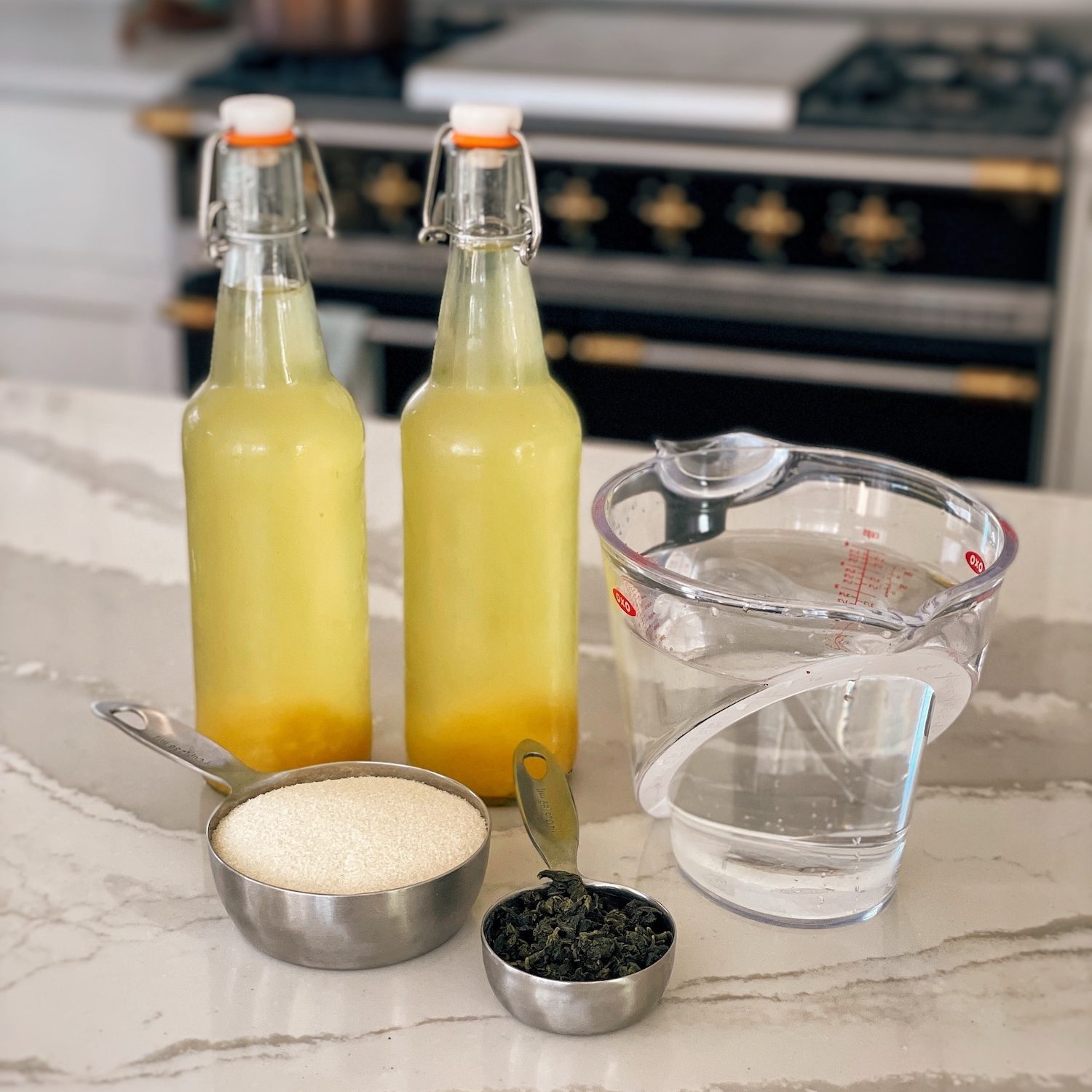
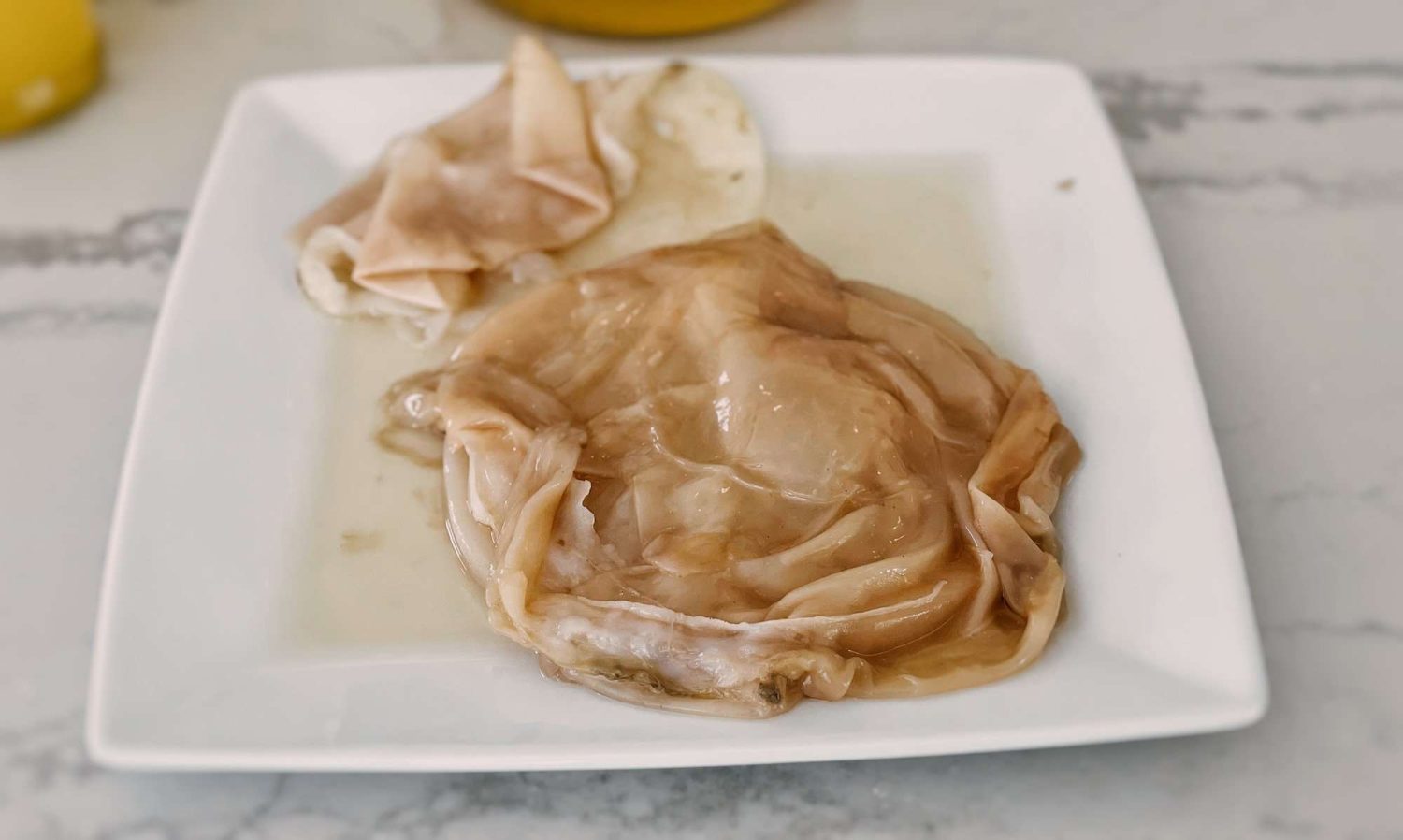
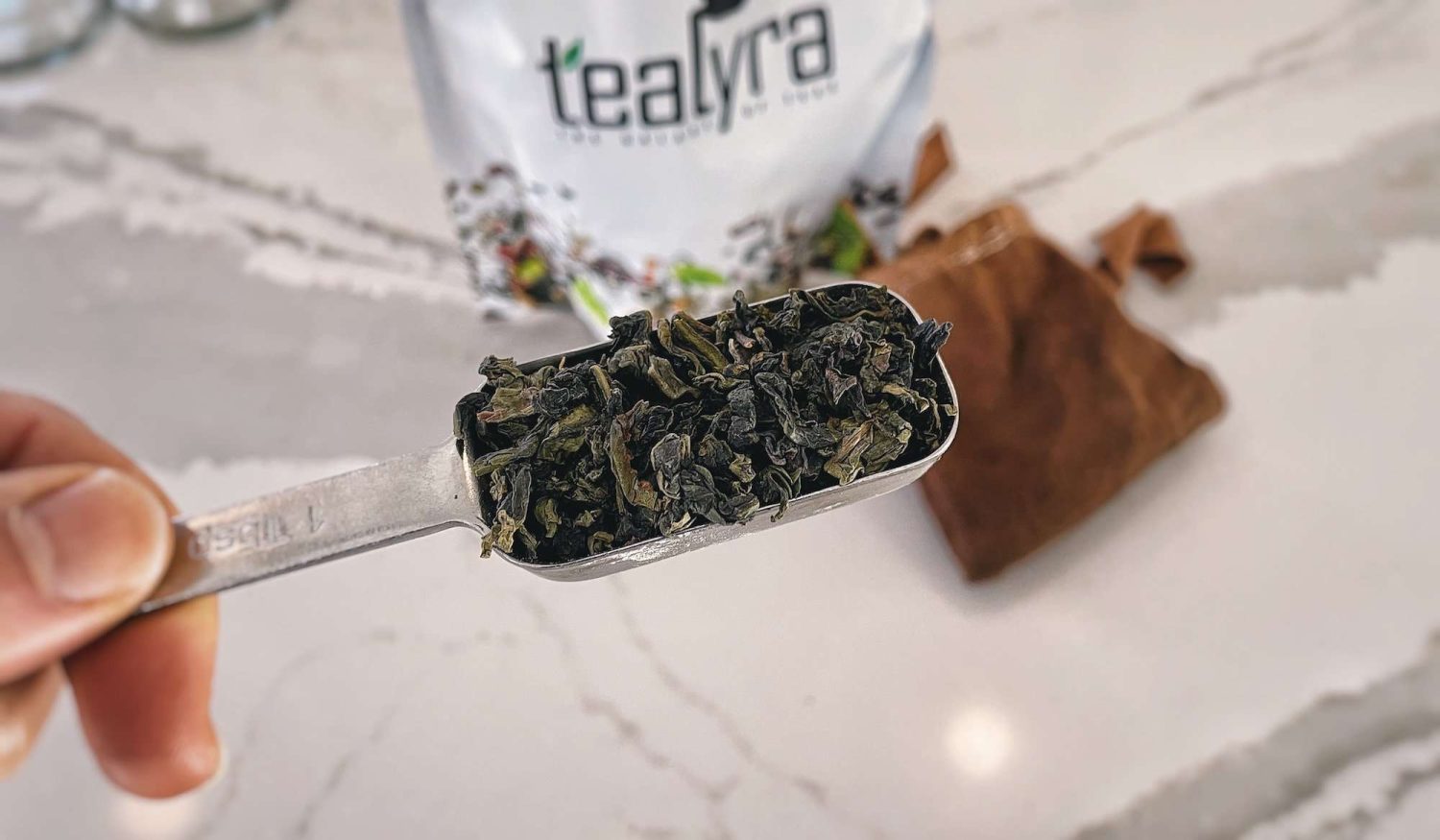

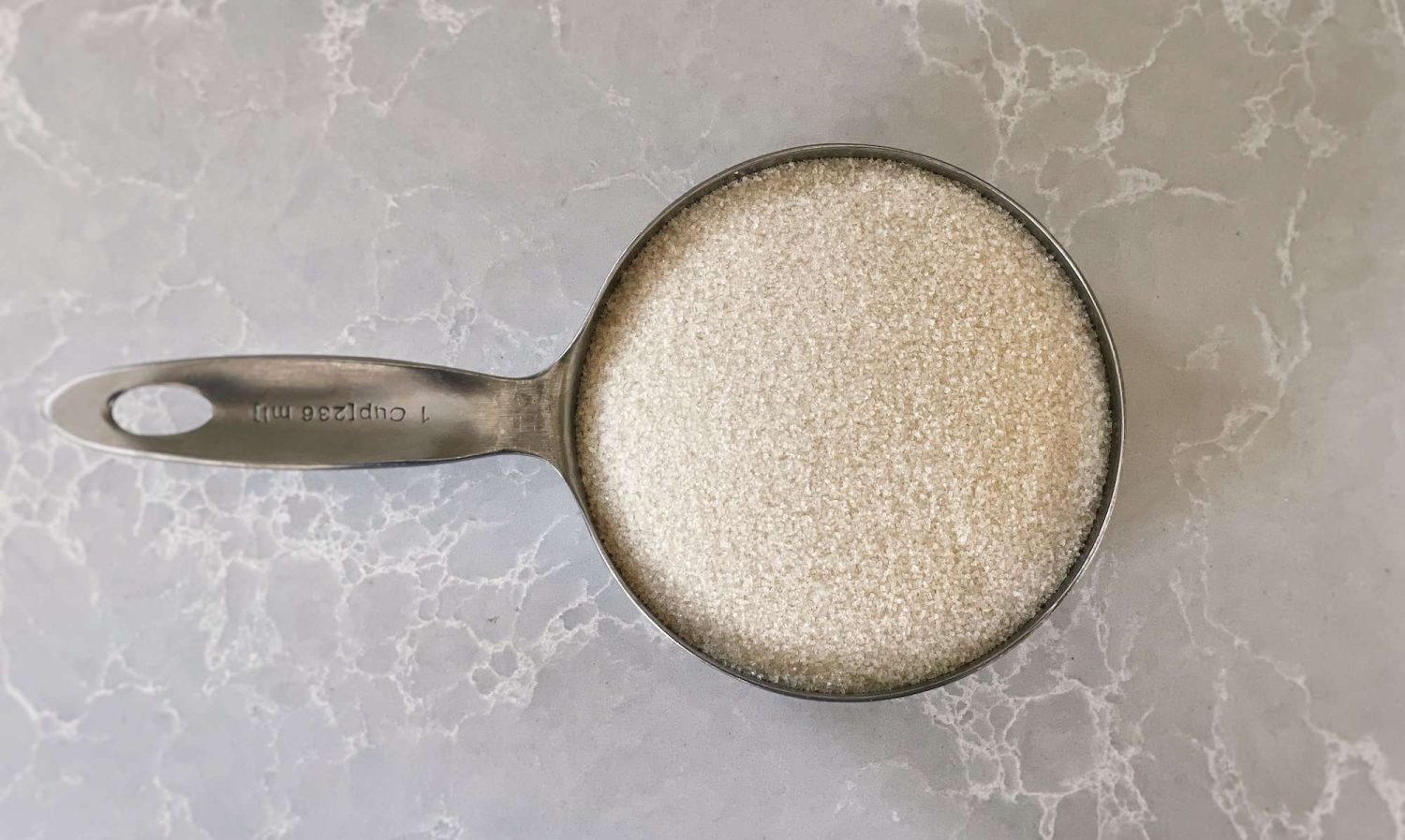

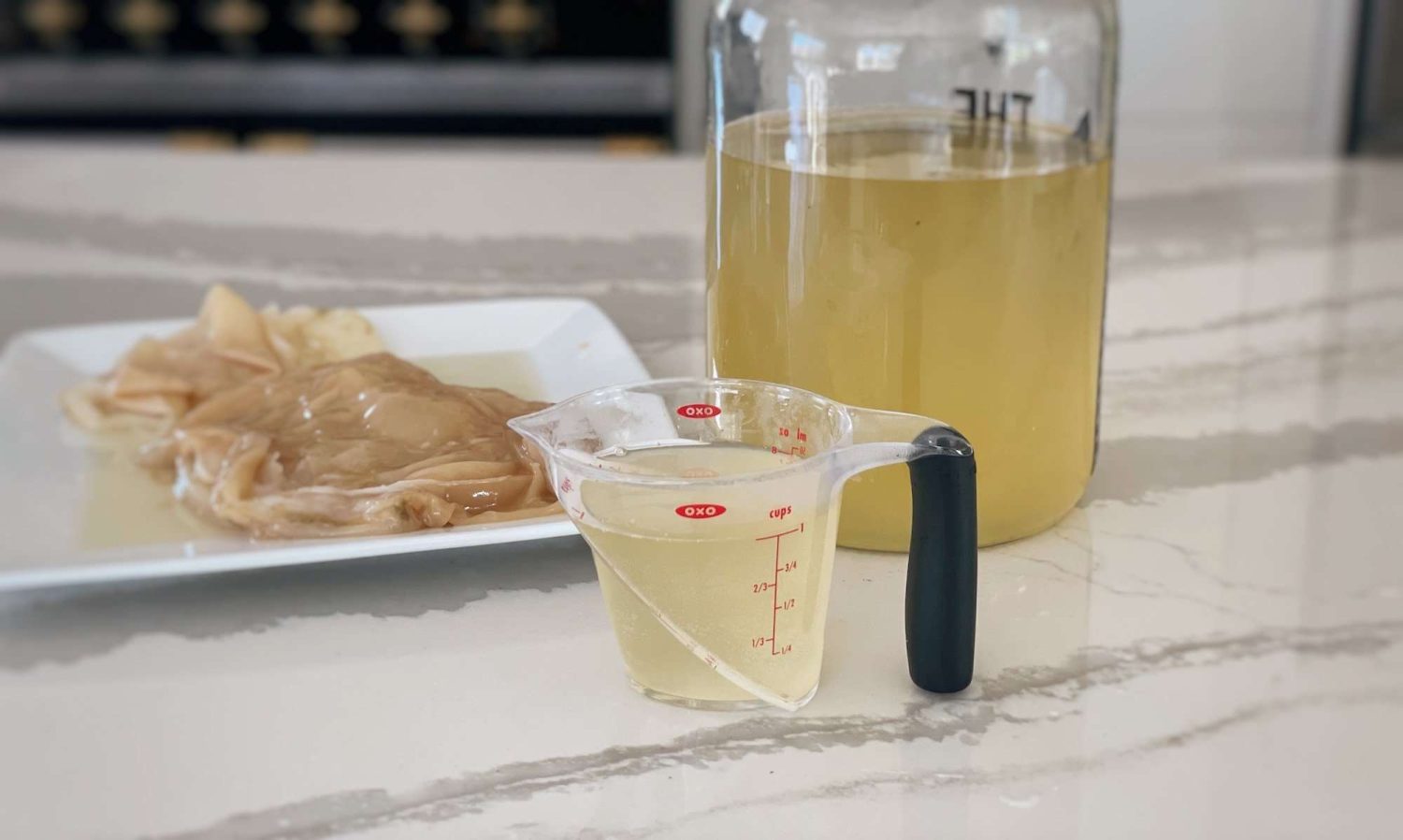

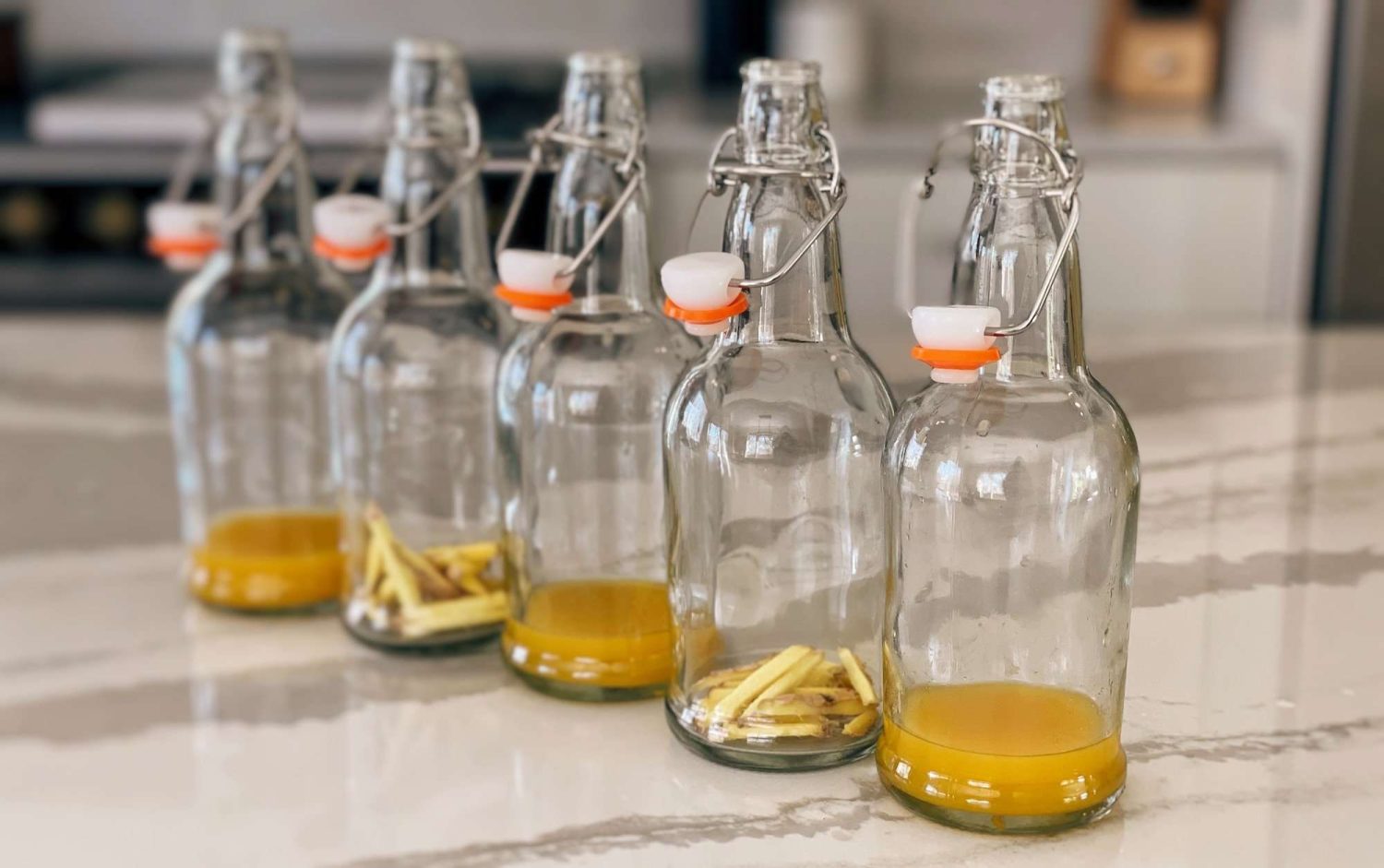
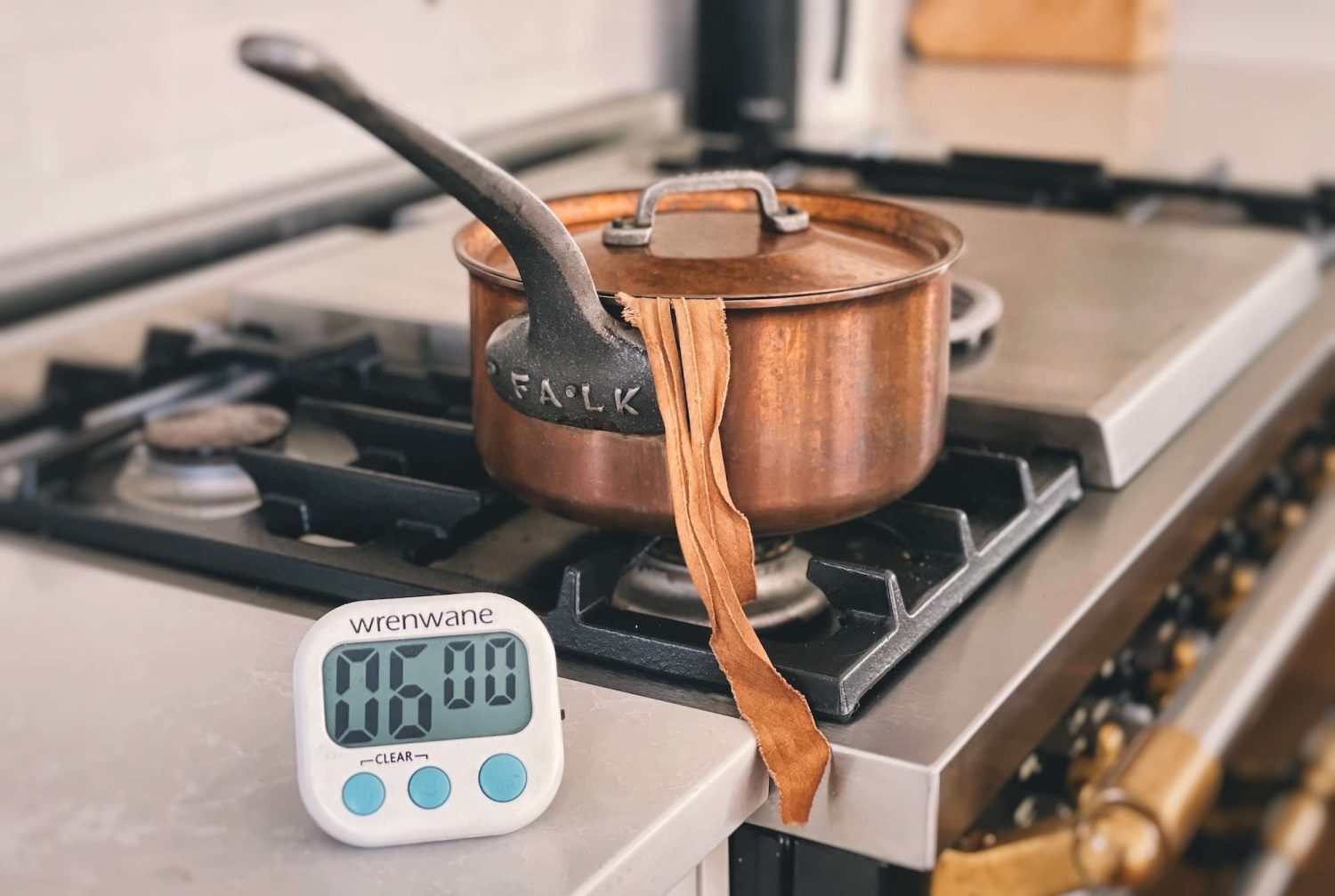
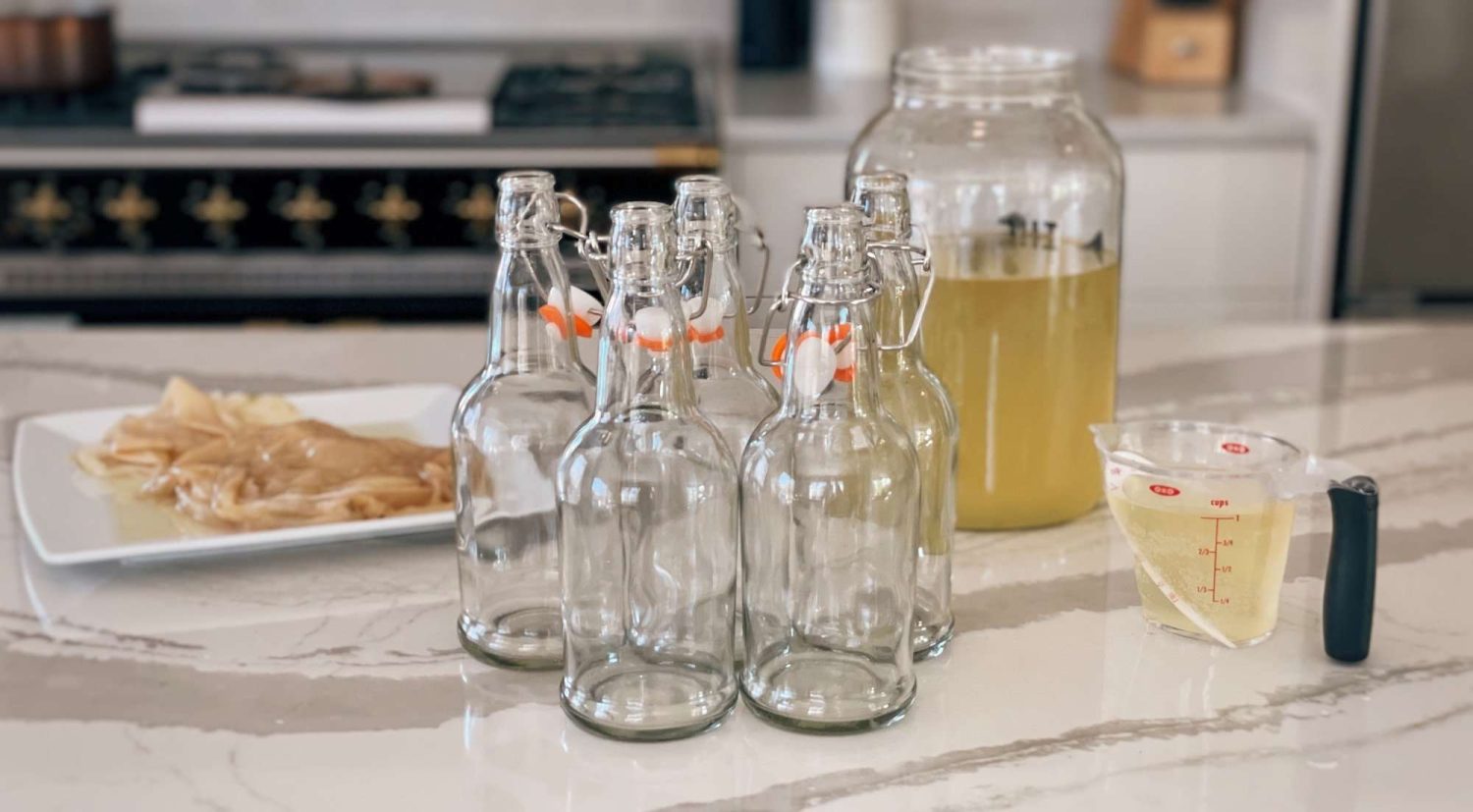
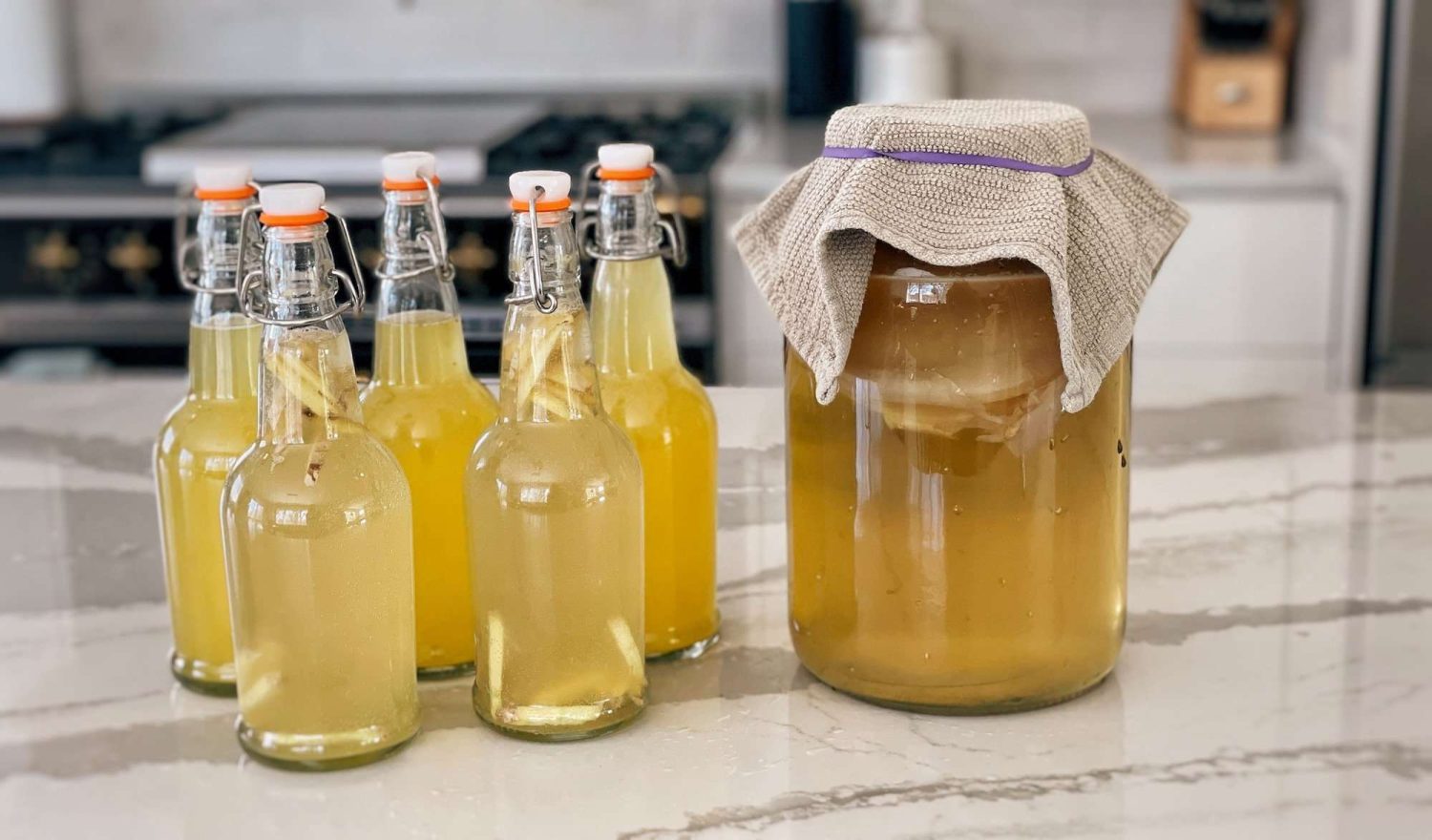
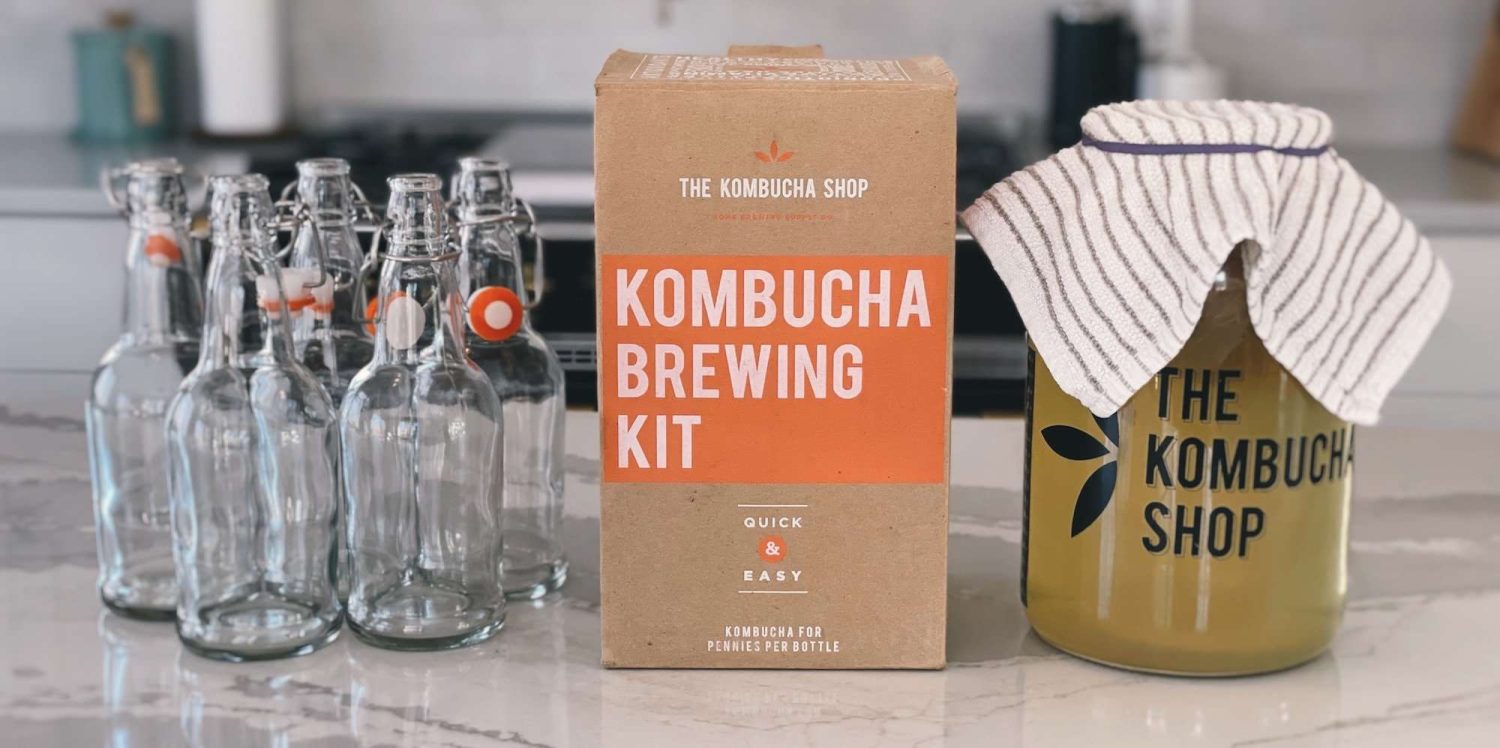


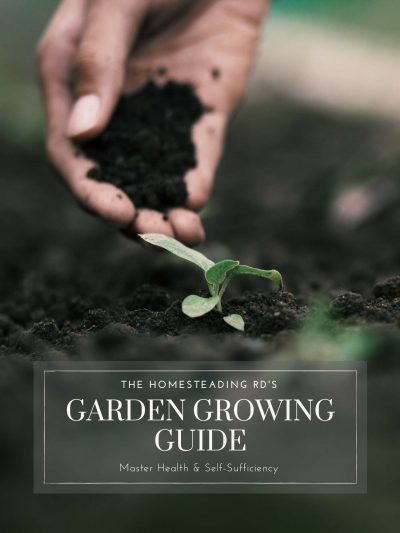
Oh I’m excited to try your techniques! I use a similar ratio of sugar and water but I have always added less tea bags and I boil all the water at once. Then I have to wait for it to cool. I will try this recipe my next batch. I just love homemade Kombucha especially with mango or peach juice or fresh ginger. Store bought is just so blah but will do in a pinch. I was able to get recycled Grolsch bottles and they work great.
Mango is my favorite, too! So tasty and I agree – SO much better than store bought 🙂
I’ve been fermenting Kombucha for a few years with decent results, your great post has encouraged me to have more confidence and become more adventurous, experimenting with teas! Thank you!
Hooray! I’m so glad to hear it 🙂
Your blog is sooo informative and helpful! I appreciate your attention to detail. I absolutely love kombucha and can’t wait to try it homemade. Thanks girl! 🤩
If you already like store-bought kombucha, then you’ll LOVE homemade! It’s 100x better!
I’m going to try this! 😀
You’ll be so happy you did! 🙂 So tasty!
Can’t wait to try this out ☺️✨looks healthy
Yay! You’re going to love it 🙂
We’ve been thinking about starting up a batch of kombucha, but we’re hesitant because we don’t know if we’ll like it or not. We want the health benefits, though. Would you recommend starting with a store-bought bottle of kombucha to try first before buying anything to start our own?
I think starting with store-bought is a great place to start, but of course keep in mind that home-brewed (like with all things) always tastes better. I think the GT brand is the best. Another option is to find a friend that brews kombucha and try some of theirs 🙂
What a helpful post!! I’ve been making my own Kombucha for a few years now, but I haven’t strayed much from the basic version. I’m SO excited to dig in here and try something new
Excellent!!! I love exploring new flavors and combinations 🙂
I should definitely try to make Kombucha at home, I’m such a big fan! Thank you for explaining how to regulate the sweet flavor, I’m not a fan of sugary drinks. So happy I found this article 🙂
You definitely should! It’s so easy to make and saves a lot of money on the long run.
This is so interesting-I love kombucha, but have never tried to make my own. Thanks for sharing!
It really is such a tasty drink! I love it and especially now that I can make it for pennies! 🙂
Now i see why Kombucha is so expensive. Your detailed process for making this healthy drink makes me appreciate it even more.
I’m so glad to hear it!